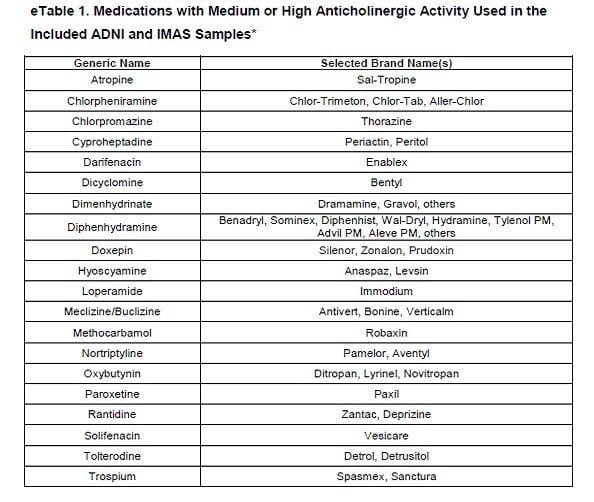When Drug-Induced Brain Fog is Brain Loss
A study published just this week again highlighted the dangers of taking anticholinergic drugs, especially for seniors. These drugs include common over-the-counter drugs that you probably have in your medicine cabinet, as well as prescription drugs.
Anticholinergics block the neurotransmitter acetylcholine, an essential biochemical for brain function. While this information has been known for over six years, the unique feature of this new study is the pairing of cognitive function tests with brain imaging scans.
The study included hundreds of seniors with an average age of 73. Mental decline documented by memory and functional tests was seen in parallel with the shrinking of brain layers and an increase in the size of empty spaces in the brain. Exposure to anticholinergics drugs caused diagnosable decline in just one month of exposure. Greater decline was linked to taking more than one of these drugs.
Anticholinergic drugs include allergy preparations and sleep aids. Many over-the-counter sleep aids contain allergy meds such as Dimetapp which cause drowsiness. Here is a partial list of common OTC drugs containing diphenhydramine which seniors should opt to avoid:
- Advil PM
- Bayer PM
- Nytol
- Sominex
- Unisom
- Aleve PM
- Excedrin PM
- Simply Sleep
- Tylenol PM
Other drugs which have anticholinergic effects include some antidepressants, the ulcer med Tagamet, and bladder control medications, including Oxytrol. Xanax is yet another preparation which can affect brain function. There are many other drugs which also have the same effects. (See the table at the bottom of this post.) Ask your doctor and read warning labels. You are your own best advocate for your health.
Our takeaway points for seniors:
- Avoid taking sleep aids. As we reported previously, seniors (and women) do not clear sleep aids from their blood stream well. They often have a hangover effect from these drugs. Studies also indicate that effectiveness claims are highly inflated. Using restful techniques will be better and less harmful.
- The same goes for allergy medications. Many people reduce symptoms by avoiding dairy products and gluten. If you still need relief, use less anticholinergic options, and use them sparingly.
- If you notice head fog, grogginess, and an inability to function normally with any drug, report your symptoms to your physician and ask for an alternative treatment.
At Stillman and Friedland we do our best to bring you the latest and best information for your health and recovery.
Reference table (Image Credit: Pharmacy Times)







